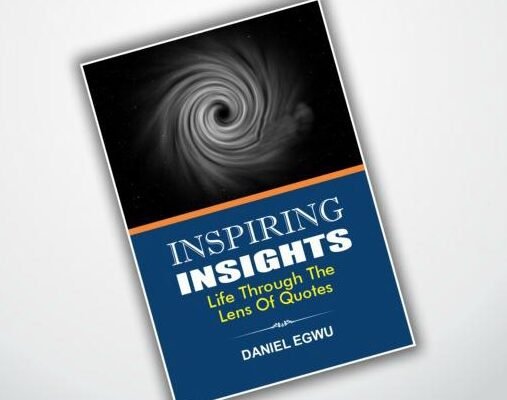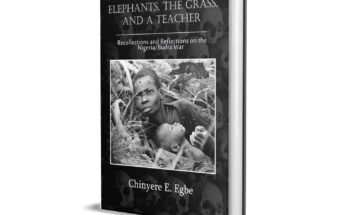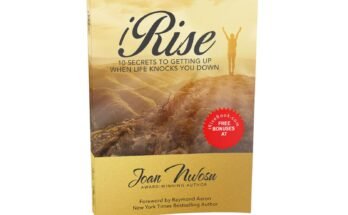BOOK REVIEW
Title: Inspiring Insights: Life Through the Lens of Quotes
Author: Daniel Egwu
Number of Pages: 126
Publisher: Intelmedia Resources
ISBN: 978-978-696-157-6
Reviewer: Dr. Tony Onyima

Mr. Daniel Egwu
Introduction: What a Review Should Do
A genuine book review is not merely about summarizing content. It serves as both a mirror and a lens: a mirror reflecting the author’s intent and a lens that sharpens the reader’s engagement with that intent. Each review, therefore, becomes a dialogue between the author who dares to share and the reader who wrestles with, affirms, or challenges those insights. It does not stop at “what is in the book”; it delves deeper into why it matters, and what it adds to the quest for meaning, resilience, and wisdom.
Daniel Egwu’s Inspiring Insights: Life Through the Lens of Quotes invites exactly this kind of conversation. It is not a dense treatise or abstract philosophical manual. Instead, it speaks with the warmth of stories, the simplicity of proverbs, and the resonance of lived faith. At its heart, it is about equipping ordinary readers to survive life’s storms, grow through failures, and thrive with gratitude.
Structure and Approach
Egwu structures his book into 31 concise chapters, each lasting three to six pages. This design makes the work very accessible — perfect for daily devotion, small group discussion, or reflective reading at one’s own pace. Each chapter opens with a guiding quote, followed by a story (often rooted in Nigerian experiences), and ends with a reflection. The preface summarises the author’s approach: “Each quote holds a story, a lesson, and an invitation to reflect on life’s complexities.”
What sets Egwu’s approach apart is his blending of narrative and meditation. Unlike anthologies that just accumulate quotes, Egwu regards each saying as a gateway to deeper reflection. The story anchors the quote, and the reflection helps it blossom into wisdom. In this way, the lessons feel less like maxims imposed on the reader and more like insights gained through lived experience.
Storytelling as Illumination
Egwu’s strength lies in his ability to turn storytelling into moral illumination. For instance:
- In Chapter One, Walter, a character who once soared with ease, is struck by storms of bereavement and job loss. The guiding quote — “God never promised that the weapons would not form, but He did promise they would not prosper” — anchors the narrative in hope. Egwu concludes with a memorable line: “To have faith is not to sail on a boat without storms, but to sail on a boat that no storm can sink.”
- In Chapter Two, Nneka’s reckless infatuation blinds her to danger, leading to tragedy. The framing quote — “Good judgment comes from experience, and experience comes from bad judgment” — reminds readers that mistakes are often life’s harshest but most effective teachers.
In both cases, Egwu doesn’t simply deliver a moral. He engages the reader through empathy and then transforms the story into a lesson. It is this rhythm — empathy, reflection, application — that makes the book far more captivating than a mere list of wise sayings.
Thematic Richness
Several themes recur throughout the book, each illuminated by story and proverb:
- Resilience in adversity: Life is not storm-free, but storms need not sink us.
- Discernment and judgment: From gullibility to wisdom, mistakes shape our growth and development.
- Self-worth and dignity: Especially for youth navigating vanity, betrayal, or societal pressure.
- Gratitude and compassion: Reminders to fill one’s own cup before pouring into others.
These themes are not uniquely Nigerian, yet Egwu situates them within deeply Nigerian contexts: NYSC corps members wrestling with choices, beauty queens confronting vanity, or the haunting aftermath of the civil war. This grounding makes the lessons relatable and vivid for local readers, while still carrying universal resonance.
An African Voice in Inspirational Literature
Placed alongside global classics like Norman Vincent Peale’s The Power of Positive Thinking or John Maxwell’s leadership devotionals, Egwu’s work distinguishes itself with its African flavour. Western authors often emphasise personal ambition, self-help, or corporate leadership. Egwu, by contrast, draws from community values, folk wisdom, and faith traditions.
Consider the proverb: “When nakedness promises you clothes, first look at what it is wearing.” In Egwu’s hands, it becomes a discussion on gullibility in an age of fraudsters and false prophets. This is distinctly Nigerian yet broadly relevant — a local metaphor with global relevance.
In this sense, Inspiring Insights fills a gap. It demonstrates how wisdom literature can emerge from African soil, enriched by its idioms and struggles, and still speak across borders. Nigerian readers will feel at home, while international readers may require explanatory notes on cultural references (e.g., “419 scammers”), but the underlying wisdom remains universal.
The Book’s Heartbeat
The book’s greatest insight appears in Chapter Seven: “When you cross oceans for people, it is not necessarily about what you get back — it is about realising they may not even bother to cross a puddle for you.”
This sentence alone embodies Egwu’s hallmark: tough yet tender, candid but compassionate. It distils disappointment into a clear-eyed lesson without bitterness. Egwu’s voice here isn’t that of a distant sage but a fellow traveller — someone who has stumbled, endured betrayal, and emerged with hard-won wisdom. This pastoral sincerity is what lends the book its lasting appeal.
Strengths and Contributions
- Accessibility: The book’s short chapters and simple language make it accessible to both casual and serious readers.
- Integration of faith and pragmatism: Egwu draws seamlessly from Scripture, psychology, proverbs, and everyday encounters.
- Cultural authenticity: Rooted in Nigerian life yet reaching universal human concerns.
- Practical application: Each chapter feels like a mini homily, urging the reader not just to remember but to live differently
Weaknesses and Areas for Improvement
No book is flawless, and Inspiring Insights has its shortcomings:
- Editorial lapses, such as incorrect word choices (“loose” for “lose”) and incorrect verb forms (“bursted” instead of “burst”), as well as spacing glitches, occasionally jar the reading experience.
- Repetition of themes: Resilience, discernment, and gratitude recur throughout chapters, occasionally with overlapping examples. This can seem cyclical rather than new.
- Occasional over-explanation: After compelling stories, Egwu sometimes lessens the impact by going into overly detailed analysis.
These weaknesses, however, are not fatal. They can be addressed in future editions, and they do not diminish the book’s core qualities: its sincerity and wisdom.
Why This Book Matters
In an era saturated with motivational content, from Instagram quotes to self-help seminars, what makes Egwu’s work necessary?
First, it reaffirms storytelling as the vessel of wisdom. In a digital age of soundbites, Egwu insists that lessons are best absorbed through narrative and reflection.
Second, it offers a Nigerian and African voice in a field mainly led by Western authors. This matters not just for representation but also for authenticity: it demonstrates how wisdom develops from specific soil yet resonates everywhere.
Finally, it addresses readers at all stages of life:
- A student seeking guidance on choices will find it.
- A professional facing setbacks will find encouragement.
- An elder reflecting on life’s lessons will find resonance.
It is not just a book to read and shelve; it is a companion for life’s journey.
Conclusion: A Companion, Not Just a Book
Daniel Egwu’s Inspiring Insights succeeds where many motivational texts stumble. It avoids overwhelming with jargon or sounding condescending. Instead, it sits alongside the reader, sharing stories, posing questions, and leaving behind snippets of wisdom worth holding onto.
Yes, the book could be more tightly edited. Yes, it sometimes repeats itself. But its imperfections are outweighed by its sincerity and substance. At its best, it offers the reader the courage to face storms, clarity to make decisions, and compassion to live a meaningful life.
My verdict? Inspiring Insights should not sit on a dusty shelf, but on the bedside table — to be sipped slowly, pondered, and applied. Like the best books, it leaves the reader not just informed but transformed, asking: Am I living by wisdom, or still learning the hard way?
Final Assessment: A heartfelt, story-driven devotional that speaks with an African voice to universal struggles. Highly recommended for anyone seeking wisdom grounded in both faith and lived experience.
Tony Onyima is a media consultant, former Managing Director of Sun Newspapers Ltd and one-time Commissioner for Information, Anambra State, Nigeria.
![]()






